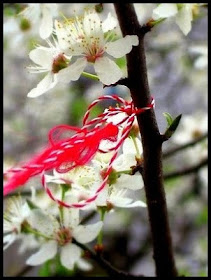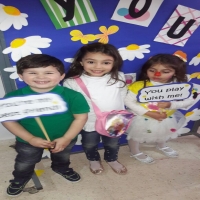![]() Published in Romania - Social interactions and entertainment - 01 Mar 2020 09:36 - 7
Published in Romania - Social interactions and entertainment - 01 Mar 2020 09:36 - 7
A cunoaste. A iubi.
Inca-odata, iar si iara,
a cunoaste-nseamna iarna,
a iubi e primavara.
Lucian Blaga
To know. To love.
Again and again,
to know means winter,
to love and spring.
Lucian Blaga

“Mărțișor is an old tradition celebrated all over Romania every year, on March 1st.
The name Mărțișor is a diminutive of March (Martie in Romanian). It is
believed that the person who wears the red and white string would enjoy a
prosperous and healthy year.

Not long ago, in the countryside, people used to celebrate the Martisor by
hanging a red and white string at their the gate, window, cattle's horn
and shed to protect against evil spirits and to invoke nature's
regenerative power.



In eastern Romania (Moldova and Bucovina), the red and white string was complemented with a small - gold or silver -
coin. After wearing the coin for twelve days, the women would buy fresh
cheese with it hopping that their skin would be healthy and beautiful
the entire year.

According to archaeological research, the Mărțișor traces its history more than 8,000 years ago. Some ethnologists believe
that the Mărțișor celebration has Roman origins, others support the
theory that it is an old Dacian tradition.
In ancient Rome, the New Year's was celebrated on the 1st of March. March ('Martius') was named
in the honor of the god Mars. Mars was not only the god of war but also
the god of agriculture, which contributes to the rebirth of vegetation.
The Dacians also celebrated the New Year's on the first day of March. Ample spring celebrations were consecrated to this event.



In the old times, Mărțișor were made of small river pebbles, colored in
white and red, stringed on a thread and worn around the neck. They were
worn, to bring good luck and good weather, from March 1 until the first
trees would bloom. When the first trees were flowering the Mărțișor
were hanged on tree branches.


Nowadays, on March 1, Romanians buy silky red-white threads (șnur) tied into a bow to which a small trinket
is attached and offer them to their (female) family members, friends and
colleagues to show friendship, respect or admiration.”

The cultural practices ociated to the 1st of March in Bulgaria, North
Macedonia, Republic of Moldova and Romania (Mărțișor) were inscribed in
2017 on the UNESCO’s Representative List of the Intangible Cultural
Heritage of Humanity.


Support
LackoaNemethevilgodevilgodKame SenninKame SenninKame SenninKame SenninKabesosHan SolotitzianorevenirearevenirearevenirearevenireaPony of DarknessViladiaFarhadEsEklavyaaIVMenPMihaiHaRoSHaRoSHaRoSHaRoSHaRoSHaRoSHaRoSHaRoSHaRoSHaRoSHaRoSRaDvIncobiCOMBEDacianAeGuramkoronaBombero1976matraguna8matraguna8matraguna8matraguna8matraguna8matraguna8matraguna8matraguna8matraguna8matraguna8matraguna8TonySimionkatalinxkatalinxkatalinxkatalinxkatalinxkatalinxkatalinxkatalinxkatalinxkatalinxovicaLeona1960The Chosen OneBabacukavalaFragUKnikiruHaiN EvLaTBhalaurBhalaurBhalaurBhalaurBhalaurBhalaurBhalaurBhalaurBhalaurBhalaurYerliVeMillimanchomanchomanchoAinzmaxaurelijeAlexinhoAlexAlexinhoAlexPinataWhiskasKhalifaWhiskasKhalifaWhiskasKhalifaWhiskasKhalifaWhiskasKhalifaWhiskasKhalifaWhiskasKhalifaWhiskasKhalifaWhiskasKhalifaWhiskasKhalifaqpartekorchabondzinsinismalviMyCrowGottfried Bouillonturtumicturtumicturtumicturtumicturtumicturtumicturtumicturtumicturtumicturtumicarkantossabiesabiesabiesabiebibin maliPOP DJUJICPasRatunkowyddocGheby AxelvrajealavrajealavrajealaVladyslausVladyslausVladyslausparazituparazituparazituparazituparazituparazitumachelemachelemachelemacheleComments (7)

Super! Multumim!

This is great Slavic old tradition, and I LOVE it. Bravo for article.

Thanks! 

v c




